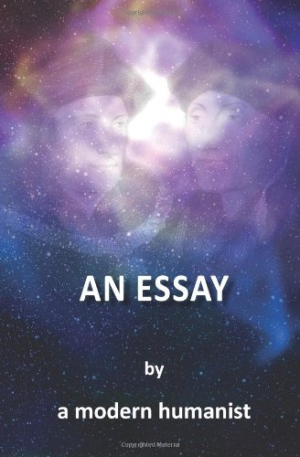An Essay by a Modern Humanist
The author of An Essay by a Modern Humanist claims to be a modern humanist, scholar, and practitioner of humanism, a system of thought based in science and observation and conflicted with the models of medieval philosophies dictated by the religious authority of the Church. Moving emphasis away from humanity’s relationship with God and an afterlife, a humanist focuses on man’s relationship with his fellow human beings, as well as the autonomy of the human intellect to guide itself and evolve through empirical trial and error rather than the irrationality of religious faith.
This work is a philosophical treatise about the perceptions of reality within the margins of the human mind. The author first tries to explain the origin of modern thought, writing, “Religion is the historical basis of virtually all modern thought, so it is not possible to look objectively at our current thought without looking at what religion is.” This important sentence is awkwardly structured and ambiguous. It is unclear if “current thought” is what the author is trying to look at objectively or whether the words refer to a recent idea.
The author chooses monotheistic Judeo-Christian Catholicism as the template for the origin of modern philosophical thought: “This essay will limit itself to the Judaeo-Christian religion as it has been expressed by the Catholic Church, for this is very well defined over three millennia, is by far the most philosophically examined and there will be some general understanding of the terms used.” The author then includes a quotation by St. James—“True religion is to do what one can for widows and orphans and to keep oneself uncontaminated by the world”—that contains humanistic ideas. Still following a religious thread, the author suggests a tie-in with quantum physics and St. Augustine’s idea that the universe was created in harmony with God’s will.
Interestingly, the author states that “religion incorporated the idea that, at its centre, was a relationship between us in this space energy system and God … who had created the Universe.” Even though religion should have no place in a modern humanist’s philosophical thesis on the perception of reality within the parameters of the human mind, the author suggests that within set logic it is almost impossible to prove the existence or nonexistence of God, let alone prove anything at all. The author follows a logical progression and attempts to explain the nature of reality in a mathematical sense as applied to a model of the quantum universe and a God. The author writes, “The only philosophical idea which comes close to this model … is that of an omnipresent being.”
At times, the author mentions people, theories, and ideas without further explanation, such as Oscar Wilde. The author assumes that the reader is already familiar with these allusions and does not explain how they relate to the piece as a whole. While the author’s ideas seem sound and set in historical accuracy, the scope of An Essay is limited to Western civilization. The text contains no footnotes or bibliography, so it is impossible to trace the author’s research.
In all, because the reader must mine through confusing sentence structure, incomplete thoughts, and vagueness, the power of this piece is severely diminished.
Reviewed by
Lee Gooden
Disclosure: This article is not an endorsement, but a review. The publisher of this book provided free copies of the book and paid a small fee to have their book reviewed by a professional reviewer. Foreword Reviews and Clarion Reviews make no guarantee that the publisher will receive a positive review. Foreword Magazine, Inc. is disclosing this in accordance with the Federal Trade Commission’s 16 CFR, Part 255.

